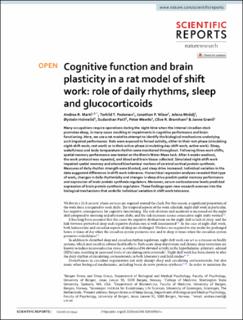Cognitive function and brain plasticity in a rat model of shift work: role of daily rhythms, sleep and glucocorticoids
Marti, Andrea Rørvik; Pedersen, Torhild; Wisor, Jonathan P.; Mrdalj, Jelena; Holmelid, Øystein; Patil, Sudarshan; Meerlo, Peter; Bramham, Clive R.; Grønli, Janne
Journal article, Peer reviewed
Published version

Åpne
Permanent lenke
https://hdl.handle.net/11250/2738476Utgivelsesdato
2020Metadata
Vis full innførselSamlinger
Sammendrag
Many occupations require operations during the night-time when the internal circadian clock promotes sleep, in many cases resulting in impairments in cognitive performance and brain functioning. Here, we use a rat model to attempt to identify the biological mechanisms underlying such impaired performance. Rats were exposed to forced activity, either in their rest-phase (simulating night-shift work; rest work) or in their active-phase (simulating day-shift work; active work). Sleep, wakefulness and body temperature rhythm were monitored throughout. Following three work shifts, spatial memory performance was tested on the Morris Water Maze task. After 4 weeks washout, the work protocol was repeated, and blood and brain tissue collected. Simulated night-shift work impaired spatial memory and altered biochemical markers of cerebral cortical protein synthesis. Measures of daily rhythm strength were blunted, and sleep drive increased. Individual variation in the data suggested differences in shift work tolerance. Hierarchical regression analyses revealed that type of work, changes in daily rhythmicity and changes in sleep drive predict spatial memory performance and expression of brain protein synthesis regulators. Moreover, serum corticosterone levels predicted expression of brain protein synthesis regulators. These findings open new research avenues into the biological mechanisms that underlie individual variation in shift work tolerance.
